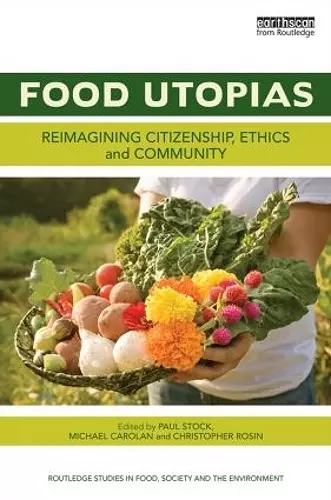Food Utopias
Reimagining citizenship, ethics and community
Michael Carolan editor Christopher Rosin editor Paul V Stock editor
Format:Hardback
Publisher:Taylor & Francis Ltd
Published:15th Jan '15
Currently unavailable, and unfortunately no date known when it will be back
This hardback is available in another edition too:
- Paperback£49.99(9781138299337)

Food is a contentious and emotive issue, subject to critiques from multiple perspectives. Alternative food movements – including the different articulations of local, food miles, seasonality, food justice, food knowledge and food sovereignty – consistently invoke themes around autonomy, sufficiency, cooperation, mutual aid, freedom, and responsibility.
In this stimulating and provocative book the authors link these issues to utopias and intentional communities. Using a food utopias framework presented in the introduction, they examine food stories in three interrelated and complementary ways: utopias as critique of existing systems; utopias as engagement with experimentation of the novel, the forgotten, and the hopeful in the future of the food system; and utopias as process that recognizes the time and difficulty inherent in changing the status quo.
The chapters address theoretical aspects of food utopias and also present case studies from a range of contexts and regions, including Argentina, Italy, Switzerland and USA. These focus on key issues in contemporary food studies including equity, locality, the sacred, citizenship, community and food sovereignty. Food utopias offers ways forward to imagine a creative and convivial food system.
"As we choke on the carbon-sourced calories of industrial food this book alerts us to the openings for doing food differently. Food Utopias shows us how critique, experimentation and an open embrace of indeterminate processes can make a difference. This book is seriously fun to think with and a must-read for all who are invested in a liveable future." – J.K. Gibson-Graham, Institute for Culture and Society, University of Western Sydney, Australia.
"Food Utopias re-imagines the enduring intellectual project of utopian-inspired thought and praxis by linking it directly into food, and gives utopian visioning serious twenty-first century content by asking how we might ‘start to talk about and envision new ways of doing, growing and sharing food’. Its timely message offers hopefulness, and a rebuttal of the thought constrictions of mainstream corporate food narratives that declare there are no other ways to do food bar theirs. The book invokes food utopias as a tool to experiment food in the multiple and in its total experiences, to open and sustain dialogue around whose ideas should matter over food. This is boundary-breaking stuff aimed at the widest of readerships." – Richard Le Heron, School of Environment, University of Auckland, New Zealand.
"H. G. Wells wasn’t just a wellspring of science fiction – he was an active social scientist. He thought that 'the creation of utopias – and their exhaustive criticism – is the proper and distinctive method of sociology.' In this book, Paul Stock, Michael Carolan and Christopher Rosin have curated a fine collection of thoughtful explorations of, and in, the utopian tradition. These essays encourage students, scholars and dreamers alike to imagine the world with fewer constraints – and a better sense of history. H.G. Wells would be proud."– Raj Patel, Lyndon B. Johnson School of Public Affairs, The University of Texas at Austin, USA.
"The food system is a global success – feeding more people than ever before. Yet environments are harmed, hunger persists, and huge numbers of people suffer the often severe consequences of eating badly. This fine, timely and incisive book offers a novel framework for collaborative action among scientists of many disciplines (from sociologists to ecologists) and practitioners by setting out attainable utopias for food and agriculture: how we can eat well, engage more, be healthy and save the planet too. No such journey is easy, but making clear there are both pathways and multiple end points is a necessary start. Acting together, much now is possible." – Jules Pretty, University of Essex, UK.
"[G]eographers will find this book relevant to understanding the contemporary articulations of food, aiming to both assess, and present alternatives to, the current food system." – Social & Cultural Geography, Diana Soeiro, Universidade Nova de Lisboa, Portugal.
ISBN: 9781138788497
Dimensions: unknown
Weight: 521g
238 pages